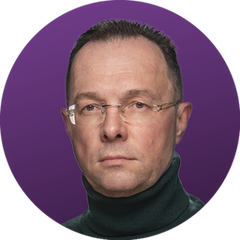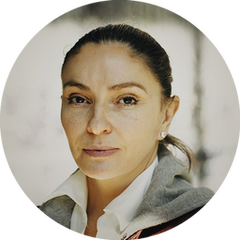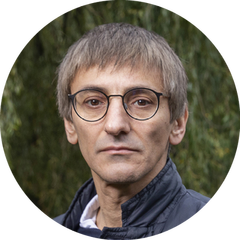news media
HOSTING THE
Russian free press
Russian voices can be heard in the cafeteria. Inside TV Rain’s studio, Cyrillic letters fly across a giant screen, while outside journalists from Moscow still look a bit wobbly navigating Amsterdam’s bike traffic. When the request came, DPG Media didn’t hesitate for a moment, committed as it is to press freedom. Now critical journalists who had to flee Moscow because of the war in Ukraine are working out of DPG Media’s Amsterdam office. Their coverage ensures that Russians retain access to fair and balanced news alongside Putin’s state propaganda. The office, which has its own TV studio, now hosts two editorial teams, soon to be joined by a third one. What’s it like for these Russian journalists to live and work in Amsterdam?

Alexander Gubsky (53),
journalist and publisher of The Moscow Times
“Russian society needs truthful information”
“When the war started, a law was passed in Russia that made just using the word ‘war’ punishable by up to 15 years in prison. We were forced to leave the country in a hurry. Luckily, thanks to Derk Sauer (the Dutch founder and owner of The Moscow Times, ed.), we were able to come to Amsterdam. I’m very thankful to DPG Media for how we were received here. It would have been a lot harder without all your help – even teaching us how to ride a bike!
I’ve fallen in love with this city and this country, and the openness people have towards others. ‘We’re just going to stay until the end of the year’, we said in the beginning. Now we all live in the city, are learning Dutch and our families can join us here. My daughter Kira is 15 and will be attending an international school in Amsterdam this summer.
The Moscow Times earns 25 percent of its revenue from advertising and reader donations – the rest comes from Western foundations. Despite our website getting shut down six times and constant DDoS attacks, we manage to reach millions of Russians, who read our articles using a VPN or follow us on Telegram. The English-language website reaches many more millions of people around the world. Our jobs as journalists have gotten more difficult, because sources can’t speak freely. But we also have anonymous contributors and many contacts in Russia. I’m glad we came here. Russian society needs the truthful information we provide.”
Lees meer

Natalya Sindeyeva (51),
founder and head of TV Rain, programme creator
“We have to rebuild our company and also our lives”
“Twelve years ago, I set out to launch an optimistic TV station with quality programming for ‘thinking’ people – something that didn’t exist yet in Russia. It became a success. We never planned it, but as repression ramped up we were the only ones to report on the protests, so TV Rain automatically became a kind of opposition channel.
We were forced to shut down when the war started. At first, we were in shock. But we have a big audience, and they expected us to keep going. Our staff, who were scattered between Tbilisi, Riga and Paris, felt the same way. We had to get equipment, and thanks to Derk Sauer we ended up coming to Amsterdam. I was homeless and sad, but it was very nice to speak with the people at DPG Media. Their support is so important. We have a good studio, but now, with more of our people coming here, it’s getting a bit cramped, so we have to start thinking ahead.
It’ very pleasant here. My son Luka is going to study mathematics at VU Amsterdam. But it’s also very painful to lose your home. We have to rebuild not only our company but also our whole lives. Obviously, we’d like to return to rebuild a new and better Russia. That’s what we hope for, but we don’t expect it to happen.”
Lees meer

Mikhail Fishman (50),
journalist, anchor of an influential weekly political programme on TV Rain
“Working as a journalist eases my existence in exile”
“I was in the middle of an online broadcast when the state censorship agency took our website offline. We were able to continue on YouTube, and we still post content there now. The regime won’t shut down YouTube because too many Russians use it for all sorts of things, and it would compromise other Google services.
When I fled Russia together with my wife, Julia, who’s also a journalist at TV Rain, we first went to the Caucasus countries. Now we live in De Pijp. Amsterdam is a liberal and very friendly city, and our 5-year-old daughter Katja is already starting to feel more at home at the neighbourhood school. We should count ourselves lucky. Living here, I do wonder if I have any right to speak about the situation in Russia, because I’m personally no longer at risk and live in comfort compared to the people back home. But I have no choice: I can’t work from Russia, but I can’t stop working either. I feel a moral and professional responsibility to tell the Russian public the truth about the war. So I have to do this, and it eases my existence living here in exile – what I do has a purpose.
My old life ended from one day to the next, which is something indescribable. I’d prefer to go back, of course. But I don’t think the war is going to end anytime soon, and I don’t think the regime is going anywhere either. I’ve accepted that I’m going to be an emigrant for a long time. This won’t be over in a month, or six months or a year.”
Lees meer